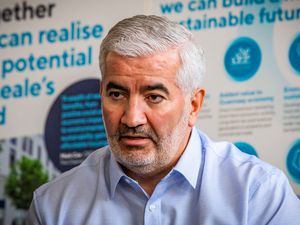‘One jurisdiction’ response needed
A ‘ONE JURISDICTION’ response to the Moneyval evaluation of Guernsey will be necessary to help secure a good report for the island, an industry expert has said.

Ian Matthews, a former regulator in the UK, and former co-chair of the FATF Evaluations and Compliance Group, was the keynote speaker for the Guernsey Financial Services Commission’s annual conference at St James, where he offered advice on how the island could secure a successful evaluation in 2024.
‘It’s important to have a “one jurisdiction” response,’ he said.
‘There shouldn’t be any playing off between operators or sectors, you should be as one jurisdiction.
‘Guernsey is being assessed not as individuals, associations, or firms, but they will be looking at Guernsey as a whole to see how effective systems are and seeking consistency between all sectors.’
He said that the island needed to work on developing a narrative as a jurisdiction.
Between 30 and 40 firms can expect a visit from Moneyval assessors when they come to the island in the first quarter of 2024. Mr Matthews urged those firms to work with the assessors and to be as open as they can.
He said that firms inspected should be prepared to explain concepts and context to the assessors, who may not be too aware of how complex structures might work.
‘Have an open dialogue with the assessment teams, acknowledge risks where they are present, and show that they can be mitigated,’ he said.
‘This has been described as the best free technical assessment you can get. I’m not convinced its free, given the resource required to prepare for it, but it is a thorough examination of your AML systems.’
Assessors will have a much-changed focus for their scheduled visit next year than on their most recent in 2014.
Mr Matthews said that the focus was much more on the effectiveness of rules and regulations rather than simply demonstrating that the laws and structures were in place, and so evidence of enforcement cases and proving just how systems work was much more important than previously.
‘Before, it was rather technical and complex,’ he said. ‘Now, that is still important but you have to demonstrate how systems are achieving intended outcomes. It’s much less about what you have in place, but how effectively it’s working.’
Mr Matthews said that other reviews conducted during this wave – Guernsey is towards the end of the process – were rarely producing substantial or high effectiveness ratings and low or moderate ratings would lead jurisdictions towards enhanced follow-up processes and possible grey-listing.
Grey-listing is something that the island and the industry will be desperate to avoid, and aside from the reputational damage and almost inevitable loss of business, Mr Matthews warned that going through the grey-listing process, through the FATF’s International Co-operation Review group, was ‘an incredibly resource-intensive process’.





